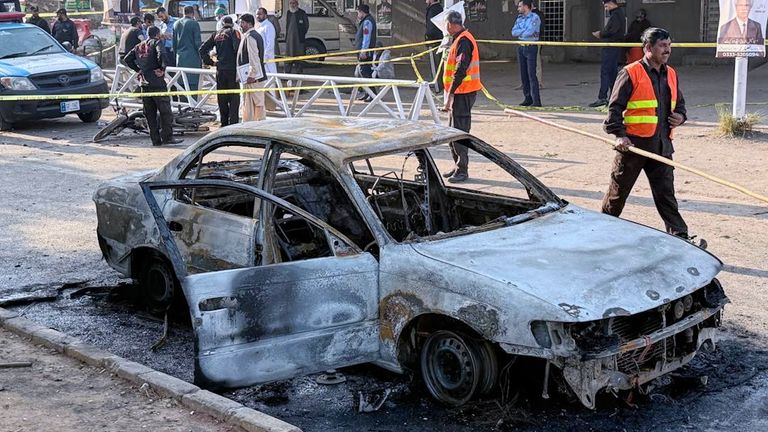
Lifestyle
Suicide Bombing Kills at Least 12 in Islamabad: Pakistan on High Alert After Deadly Court Attack
On November 11 2025, a devastating suicide bombing struck outside the district court complex in Islamabad, Pakistan’s capital. The explosion claimed at least 12 lives and injured 27 others, according to official sources. The attack, which occurred around midday, shattered the relative calm of a city that had long been viewed as one of Pakistan’s most secure zones.
The Attack
The bomber reportedly attempted to enter the court premises but, after being stopped by security, detonated explosives near a police vehicle parked outside. Eyewitnesses described scenes of chaos — shattered glass, burning vehicles, and civilians rushing to rescue the wounded. Ambulances and police units flooded the area within minutes.
Interior Minister Mohsin Naqvi confirmed that the blast was a “suicide mission” and promised a full investigation. He also noted that intelligence agencies had received vague warnings about possible militant activity, but the exact target was not known.
Who Is Responsible?
No group immediately claimed responsibility. However, several officials have pointed to the Tehrik-e-Taliban Pakistan (TTP), a group that has carried out similar high-profile attacks in the past. Pakistan’s defence minister Khawaja Asif suggested the attack may have links to militants operating from Afghanistan, accusing both Afghan and Indian elements of indirectly supporting instability within Pakistan.
The TTP, which shares ideological and operational ties with the Afghan Taliban, has ramped up attacks in recent months following the breakdown of peace talks.
Why It Matters
Islamabad has largely been shielded from the violence that has plagued Pakistan’s northwestern regions. A bombing in the capital represents a major escalation, targeting not just civilians but also a judicial institution — a symbol of state authority.
Officials described the attack as a wake-up call. “Pakistan is in a state of war,” Asif said during a press briefing. The government has since ordered heightened security at all government and judicial buildings nationwide.
Regional Tensions
The attack comes amid worsening relations between Pakistan and Afghanistan over cross-border militancy. Islamabad has accused Kabul of failing to rein in the TTP, while Afghanistan’s Taliban leadership denies harboring militants. At the same time, the incident risks further straining Pakistan’s already tense relations with India, which officials often accuse of covertly supporting separatist movements.
Human and Political Impact
Beyond the political rhetoric, families of the victims are left mourning. Survivors recounted scenes of panic and devastation. One lawyer, injured by flying debris, said, “We come here for justice — and today, justice itself was attacked.”
Hospitals in Islamabad remain on emergency alert, and the government has announced compensation for victims’ families. Security forces have cordoned off the area and are analyzing CCTV footage for clues about the attacker’s movements before the blast.
The Bigger Picture
The bombing reflects the resurgence of militancy in Pakistan. With elections on the horizon and economic instability deepening, security lapses of this nature could destabilize the fragile political environment further.
Analysts warn that without coordinated regional counterterrorism efforts, Pakistan may face a new wave of violence reminiscent of the early 2010s.
In Conclusion
The Islamabad suicide bombing is more than a single act of terror — it is a reminder of the persistent threat of extremism in South Asia. As Pakistan vows to respond with “full force,” the real challenge lies in ensuring long-term stability, addressing the roots of radicalization, and protecting ordinary citizens from the recurring cycle of violence.
Comments (0)
Please log in to comment
No comments yet. Be the first!